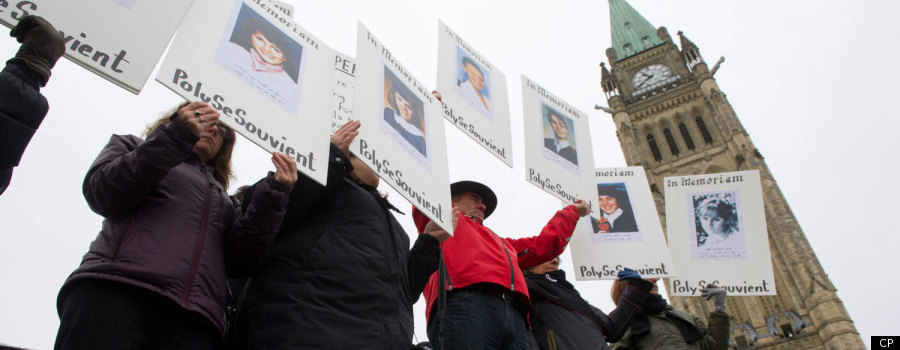 OTTAWA - Suzanne Laplante Edward awoke one morning in October, on what would have been her daughter's 43rd birthday, only to see the Conservatives introduce a bill to end the gun registry.
OTTAWA - Suzanne Laplante Edward awoke one morning in October, on what would have been her daughter's 43rd birthday, only to see the Conservatives introduce a bill to end the gun registry.That rude awakening made this Dec. 6 both personal and political for the still-grieving mother.
It was on Dec. 6, 1989, that a gunman burst into Montreal's Ecole Polytechnique, shot more than two dozen people and killed 14 women — including her daughter, Anne-Marie Edward.
Anne-Marie would have had three or four children by now; she would have been a successful engineer, Laplante Edward told hundreds of people gathered on Parliament Hill to remember the victims of the shooting.
Ensure her death won't be in vain, she urged them.
"We are about to lose a tool that is proven to save Canadian lives, to save women's lives, to save children's lives," she told the crowd Tuesday. "Please, please, do something."
The Montreal massacre, as it has become known, spurred implementation of the long-gun registry in 1991 in an effort to make firearms like the one used in the shooting traceable.
But it was dogged by cost overruns and political opposition and, in October, the Conservatives moved forward with their long-time commitment to abolishing it and destroying all the related the data.
As they lay roses to mark the women killed in December 1989, the end of the registry was as much on people's minds at Tuesday's ceremony as the memories of the women they were there to honour.
Conservatives were pointedly not invited.
Their choice to introduce the bill in the fall, when people's thoughts were turning toward the anniversary, was a callous decision, said Wendy Sol, administrative vice-president of the Communications, Energy and Paperworkers Union, which organized the event.
"It's so tragic that the Conservatives chose this time in particular, when this registry was in place in honour of those women that were murdered," she said.
"They pretend they care about the security of Canadians and yet they do this. It makes no sense."
Rona Ambrose, minister for the status of women, was planning to another vigil later in the day, said her spokeswoman.
Some Tory MPs wore white ribbons in the Commons on Tuesday to mark the national day to end violence against women, including Candice Hoeppner, who had introduced a private member's bill under the minority Conservative government to end the registry.
But her party's enthusiasm for getting rid of the registry became the viral video of the day, with footage of the vote from November flashing around the Internet showing an Alberta MP like a schoolboy playing pistol with his fingers as he rose to vote.
In a statement, the prime minister said his government had taken concrete action to prevent violence against women.
"More needs to be done. Every Canadian has a role to play in breaking the cycle of violence and discrimination against women," Stephen Harper said.
"On this tragic anniversary, let us remember and commemorate the lives of all women who have been victims of intolerable acts of gender-based violence, and let us strive to eliminate these heinous and cowardly crimes."
NDP Leader Nycole Turmel said the Conservatives weren't going far enough.
"We have to fight every day; we have to fight hard, in our homes, in our schools, in our communities," she said.
"We have to stand together like today, bravely, against a government that is turning back the clock on women's rights."
Gun-control advocate Wendy Cukier says the Dec. 6 anniversary has a dual meaning.
"This Dec. 6 more than ever before, we must mourn but we must also work for change," she told the crowd, many waving placards with "save the gun registry" slogans.
A group of six survivors and witnesses to the massacre travelled to Quebec City to pressure their provincial government to move forward with a legal challenge to the destruction of data from the registry.
In Montreal, across town from the scene of the massacre, over 100 people attended a march outside the local courthouse.
They held up signs, chanted slogans, and played out dramatic sketches about sexual stereotypes and violence against women.
Origin
Source: Huff
No comments:
Post a Comment